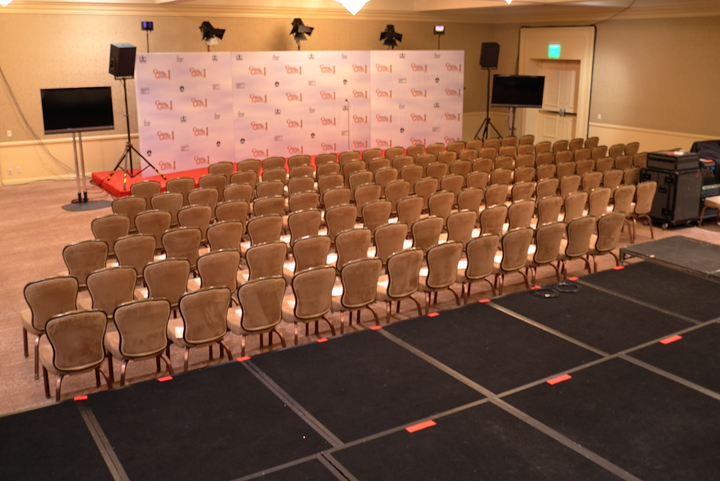
- Industry
Mildred Iatrou Morgan: Making History in Sound Editing
“Ai-Ling Lee and I would like to do big tentpole movies,” says Mildred Iatrou Morgan, the co-sound editor of La La Land, “As a team, we haven’t gotten anything like that yet. The movies we tend to get are on the smaller scale. My partner is such a talented sound designer, she definitely has the skill to create any soundscape. Ai-Ling has done sound design on many tentpole films such as Deadpool, Godzilla, Man of Steel, Transformers: Dark of the Moon, and many more, but not in the supervising capacity. When you get to that level, there are so many people vying for the position. Most of the teams are all male.”
Maybe their historical Oscar nomination as the first ever all-women team in sound editing will open doors. “Ai-Ling has done all the Maze Runner movies, and is about to do the third one. I will work with her on that sequel, but I know that if we got a chance to supervise a big budget film our team could handle it.”
Iatrou – her friends call her Milly – ascribes her success to patience and hard work. “I love the challenge of figuring things out. How do you make this work?” She compares sound editing to creating lace. “You have to be meticulous. You’re working with dialogue that was recorded on the set, reducing the noise and repairing the sound by finding an outtake to make it sound better without changing the performance.”
That was one of the challenges of the audition scene in La La Land. The song – the nominated “Audition (The Fools Who Dream)”- was recorded live on set. At the beginning of the song the furniture breaks apart to allow the camera to move in on Mia’s face. “That noise would have distracted the viewers so it had to be removed.” The film school graduate who still loves making movies on her iPhone enjoys the “teamwork and collaboration of the job.” She also loves being in the dark editing bay, with her computer.
For all her success, it hasn’t been all plain sailing. “I had to learn to ask for what I wanted” She explains of working in a male dominated field: “Early in my career, I experienced men at my level, getting promoted before me. I got lucky, when I moved to Fox about 15 years ago, and started working with John Larsen. He was really good at promoting women. One of my colleagues was promoted from editor to supervisor. I wanted to be a supervisor too, but I was working hard as an editor on another movie. I remember thinking, ‘I don’t feel ready to ask John for a supervisor role,’ but I did. He leaned over, opened a drawer, and handed me a script, saying, ‘Yeah, you would be really good at that. Tell me if you want to supervise this.’ When women ask me for advice, I tell them to ask for what they want. People are afraid to hear the word no, but they just might hear the word yes.”
Working in a field that is still male-dominated has led to some perplexing situations. “When I started in sound, I had to change the way I dressed. Coming from New York where I had worked in a museum, I would wear black tights and a skirt or dresses, with flat shoes. Nothing inappropriate. The man I worked for said, ‘I need you to move boxes and run errands. You can’t do that dressed like that.’” She laughs at the absurdity. “I wasn’t in heels or a tight skirt. I was very comfortable: just in a skirt, instead of pants. I was perfectly capable of moving boxes. Supervisors also said, “‘You look really pretty dressed like that. It makes me feel uncomfortable.’ It happened a lot when I was young. Today you can say, ‘Stop it. What you’re saying is illegal.’ Back then the attitude was, ‘Just deal with it.’ I worked hard and I’m good at what I do, but I used to worry that if I dressed like a woman, men would not take me seriously. Little by little I changed the way I dressed. I felt like I had to act and dress more like a guy, in my own feminine style. I wore a lot of jeans and sweaters. Now that I’m older and established, I can do whatever I want. I’m wearing skirts and tights again. That’s how I am comfortable.
While still uncomfortable talking about her many accomplishments, she protects her crew. “If one of the women on my team makes a suggestion that later gets co-opted by a more powerful guy, I will say, ‘That was so and so’s idea.’ I’m very polite, but I do try to address things as they happen. I feel it’s very important.”
She is also proud of her ability to make a tight budget seem like a big one. “I would love to get one of those superhero movies, with bigger budgets, but you are competing with men who are very well-established.” She laughs. “I don’t know why we don’t get them, you should see what we can do with a tight budget.”
After teaching at USC, Mildred Iatrou Morgan is optimistic about the future of women in sound engineering. “There is a new generation of women who grew up playing video games, and messing around with computers. A lot of women are very serious about audio engineering and wanting to be mixers and sound designers. I feel this generational change happening.”
Mildred Iatrou Morgan’s work can next be seen in Battle of the Sexes directed by Valerie Faris and Jonathan Dayton
Favorite past projects:
- Wild, directed by Jean-Marc Vallée
- Hitchcock, directed by Sacha Gervasi
- We Bought a Zoo, directed by Cameron Crowe
- Hairspray, directed by Adam Shankman


